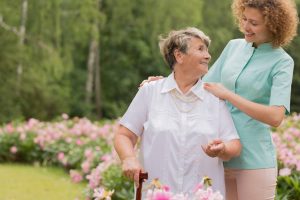 Do you have what it takes to become a caregiver? Aside from a desire to help others, there are several qualities a good caregiver needs to succeed in this role and truly help their loved ones each day. Here, Serenity Home Care offers some of the most essential caregiver skills and what you can do to support yourself in this new role.
Do you have what it takes to become a caregiver? Aside from a desire to help others, there are several qualities a good caregiver needs to succeed in this role and truly help their loved ones each day. Here, Serenity Home Care offers some of the most essential caregiver skills and what you can do to support yourself in this new role.
Organizational Expertise
Caregiving encompasses a wide range of responsibilities, and each one depends on the needs of your loved one. One of the primary skills a caregiver needs is the ability to stay organized. Being mindful and detail-oriented can help ensure you’re ready to handle routine caregiving duties and take care of new ones as the needs of your loved one evolve. These services may include the following:
- Housekeeping tasks
- Meal preparation
- Medication management
- Pet care
- Scheduling doctor’s appointments
- Coordinating social activities
- Bathing, dressing, and other personal care tasks
To stay organized, many caregivers use lists and shared calendars with smartphone alerts to ensure no task gets overlooked. Also, they make sure to have access to health records and insurance information from their loved ones for routine wellness visits and emergencies. Making sure these are organized and easy to find within the home is essential, as well.
Problem-Solving Abilities
As a caregiver, challenges may arise and it’s up to you to handle each situation appropriately. If your loved one needs memory care services for Alzheimer’s disease or dementia, this could mean finding ways to help with the following:
- Making dressing and grooming easier
- Managing behavioral issues
- Finding lost items
- Reminding them about specific people and places
- Helping them feel secure
- Maintaining physical and emotional wellness
Problem-solving skills are also key in homes that may not be the safest place for an elderly, disabled, or injured person. From installing wheelchair ramps and grab rails to encouraging shower chairs and mobility aid usage, there are many resources available for caregivers to help prevent accidental slips and falls.
Communication Skills
Good communication is foundational for any caregiver. In terms of the relationship between you and your loved one, this is critical to connecting with them. Gaining this type of assistance and finding the ideal balance can be challenging, but open, honest discussions can help. Good communication skills also help you find ways to truly connect with your loved one and provide companion care in the ways that truly matter.
Communication is also vital in terms of advocating for your loved one. Whether you’re coordinating with doctors or friends and relatives, this skill can be an asset. Speaking up and asking good questions means you’ll find the answers you require, and relating specific needs to your loved one and other relatives can help foster a better overall experience.
It’s also important to communicate with kindness and respect, especially when talking with your loved one about upcoming challenges or changes that arise outside of the regular routine. This can help ensure your relationship is firmly grounded with a sense of trust over time.
A Sense of Empathy and Compassion
Another essential quality of a caregiver is a sense of empathy and compassion. While you may interact with your loved ones each day and see what they’re going through, you may not always be aware of what they’re feeling. Realizing that transitioning from a fully independent life to requiring assistance – especially in the beginning – and showing empathy for their experience can help make this situation easier.
It’s helpful for many caregivers to put themselves in their loved one’s shoes, and reflect on how they may feel. Acting and communicating with compassion can help increase the quality of care you’re able to give each day.
A Willingness to Ask for Help
Many family members don’t realize that taking care of themselves is just as important as taking care of a loved one. After all, you can’t pour from an empty cup. With the caregiving tasks added to an already full schedule of personal and professional responsibilities, it can be easy to let your own self-care get pushed aside. Asking for help can mean several things, such as:
- Talking with a mental health professional
- Setting healthy boundaries
- Coordinating supplemental care with other family members
- Seeking professional caregiving services
If you and your loved one could benefit from professional assistance, it’s available. At Serenity Home Care in Beaverton, Oregon, our team provides in-home care services across the Multnomah, Clackamas, and Washington County areas. We deliver trusted caregiving services through programs tailored to individual family needs. For more information about our caregiver skills and resources or how we can support you and your loved one, contact us today.




